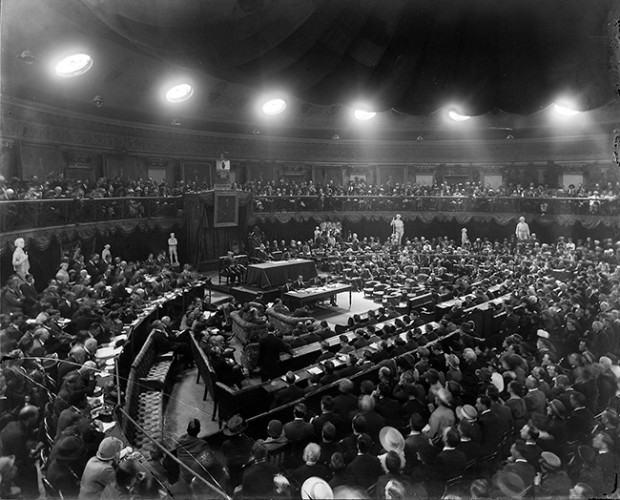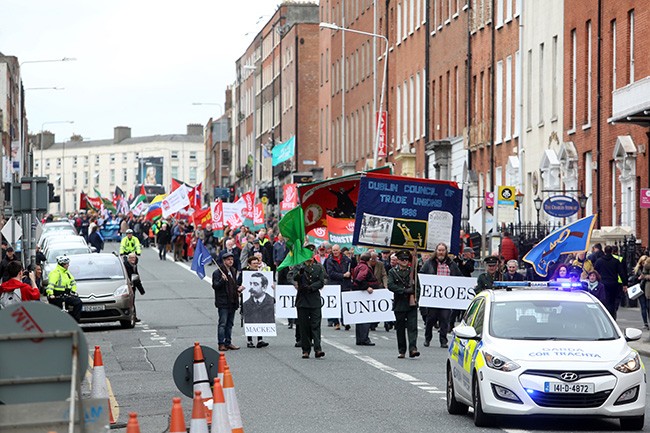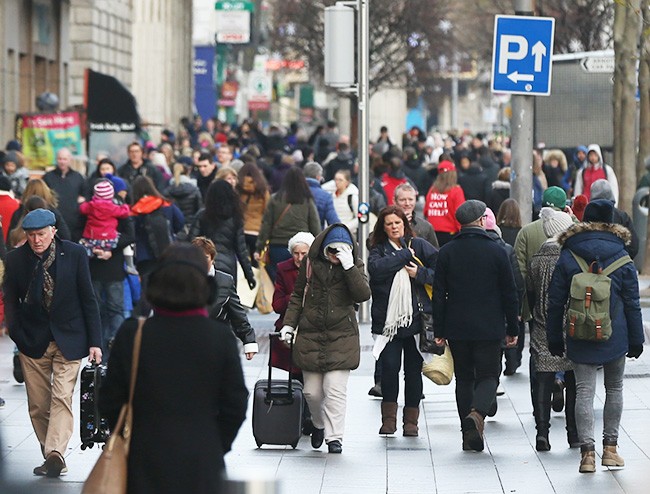1 March 2019 Edition
The Democratic Programme

100 years on from the ratification of the 1919 Democratic Programme, policy analyst Cian McMahon assesses how much progress has been made in delivering on the key principles agreed by the First Dáil. It is not good news. Progressive forces and grass roots activists in Ireland must redouble their efforts to make the vision of the Democratic Programme relevant in the 21st Century.On the centenary of the First Dáil sitting in January 1919, it is worth revisiting the economic and social agenda agreed upon by the elected representatives of the Irish people. How are we to assess the legacy of this declaration of intent in the Ireland of 2019, and what lessons can we draw for the future?
On the centenary of the First Dáil sitting in January 1919, it is worth revisiting the economic and social agenda agreed upon by the elected representatives of the Irish people. How are we to assess the legacy of this declaration of intent in the Ireland of 2019, and what lessons can we draw for the future?
The Democratic Programme of the Irish Republic asserted the right of the people of Ireland to the common ownership and democratic control of ‘all the wealth and all the wealth-producing processes within the Nation’. This spoke to the labour movement’s vision of a ‘Co-operative Commonwealth’, where the economy would serve society, and not the other way around.
Citing Patrick Pearse’s developed thinking in The Sovereign People (1916), a political pamphlet influenced by the socialist republican ideas of James Connolly, the Programme boldly stated ‘that all right to private property must be subordinated to the public right and welfare’. Only then could a sovereign people fulfil the republican ideals and ‘principles of Liberty, Equality, and Justice for all, which alone can secure permanence of Government in the willing adhesion of the people’.
A democratic and free Ireland would therefore ensure ‘the right of every citizen to an adequate share of the produce of the Nation’s labour’. From each according to their ability, to each according to their need. Does this sound like the Ireland of the twenty-first century, where the top 10 percent of the wealth distribution – the country’s richest households – owns more than 50 percent of the country’s wealth?
An important determinant of such economic inequality in Ireland today is the distribution of national income. Compared to other wealthy societies, Ireland’s income distribution, before taxes and transfers are taken into account, is one of the most unequal. The high incidence of low pay at one extreme, and of high pay at the other, reflects the weak bargaining position of many Irish workers relative to their bosses and managers.
While it is true that redistribution via the state’s tax and transfer system makes Ireland’s income distribution look more typical of our European peers, this is only part of the story. Economic inequality ultimately reflects unequal access to material resources – the goods and services needed for an adequate standard of living.

• Where trade unions and workers’ parties have organised to win power economic inequality has reduced and the living standards of the masses have increased
Unequal bargaining power in the economic sphere of the Irish workplace finds its counterpart in the political sphere of parliamentary arithmetic. This helps to explain why, since independence and partition, Ireland has never been governed by a majority left-wing administration. Partition itself has produced a carnival of economic, political, and cultural reaction. A Government representative of working class communities not only makes it easier for workers to organise for better pay and conditions through their trade unions, but also increase their ‘social wage’ – that is, the provision of public goods and services.
A given disposable income goes much further in a country where basic necessities such as housing, healthcare, childcare, transport etc. are provided publicly on the basis of need, not ability to pay, or, alternatively, are at least heavily subsidised. Standard measures of income inequality mask the unequal distribution of resources resulting from the high cost of living in countries like Ireland, where such necessities are primarily provided privately through “the market” (ie landlords and capitalists, whose primary motive is the extraction of rent and profit).
Where trade unions and workers’ parties have organised to win power in the workplace and parliament, as in many continental and Nordic European countries, better wages and conditions have been achieved at work. This has allowed state spending to focus on simultaneously increasing the social wage, rather than subsidising the low pay of unscrupulous employers. It has also meant employers paying their fair share of taxation through increased social insurance contributions. The combined result has been to reduce economic inequality and increase the living standards of the masses.
‘It shall be the first duty of the Government of the Republic to make provision for the physical, mental and spiritual well-being of the children, to secure that no child shall suffer hunger or cold from lack of food, clothing, or shelter, but that all shall be provided with the means and facilities requisite for their proper education and training as Citizens of a Free and Gaelic Ireland’. But what of the thousands of children currently accessing emergency accommodation either side of the border, many expected to carry out their homework from the confines of a hotel room? And what of the hundreds of thousands of children besides, currently living in poverty across the island?
‘Likewise it shall be the duty of the Republic to take such measures as will safeguard the health of the people and ensure the physical as well as the moral well-being of the Nation.’ Yet a million people, North and South, currently languish on waiting lists for healthcare. This is the result of an apartheid, two-tier health system in the South, where those who can afford to pay are able to jump the queue, often receiving private healthcare within public facilities; and the underfunding and creeping Tory privatisation of the NHS in the North.
As for the stewardship of ‘the Nation’s [natural] resources in the interests and for the benefit of the Irish people’ and future generations, the picture is, if anything, even more bleak. Already one of the highest per capita carbon emitters in Europe, Ireland has recently been bestowed with the title of the worst performer in the EU regarding climate action. As ever, the public right and welfare have been subordinated to the pecuniary interests and motives of large industrial and agricultural capitalists.
‘It shall be the duty of the Republic to adopt all measures necessary for the recreation and invigoration of our Industries, and to ensure they are being developed on the most beneficial and progressive co-operative and industrial lines’. This will be news to the 500 or so rural Bord na Móna workers who fear being thrown on the scrap heap without a just employment transition, as peat production is gradually phased out. And it will certainly come as news to the trade union reps and worker directors across the state sector, who have witnessed the demise of any semblance of enterprise partnership with senior management. Such is the logic of a wider privatisation agenda that has decimated the state sector, as exemplified by the Eircom fiasco, which has left over half a million homes in the South without broadband.
‘It shall also devolve upon the National Government to seek co-operation of the Governments of other countries in determining a standard of Social and Industrial Legislation with a view to a general and lasting improvement in the conditions under which the working classes live and labour.’ It bears repeating here that Ireland is one of the only countries in Europe without collective bargaining legislation that adequately obliges employers to recognise and negotiate with independent trade unions. And while grassroots activism over many decades has achieved some major victories in advancing social equality – same-sex marriage and the repeal of the Eight Amendment, for instance – these rights are still denied to Irish people in the North. Much remains to be done besides.
The remnants of Holy Catholic Ireland are still manifest in the various forms of sexism, racism, and anti-LGBT discrimination that blight the Irish psyche. Take the prevalence of anti-traveller, anti-immigrant, homophobic, and transphobic sentiment, or the conditions faced by refugees in what are mostly privately-run and state-subsidised Direct Provision centres.

• In Ireland, the public right and welfare have been put below the interests and motives of large industrial and agricultural capitalists
Progressives must step up their efforts in combatting all forms of discrimination in Irish society, including the gender pay gap in Irish workplaces. We must demand equal pay for equal work, equal representation at work and in politics, and legislation to do away with exploitative zero and low hours contracts. Combined with campaigns for adequate collective bargaining legislation and constitutional rights to housing and water, we can begin to live up to the promise of the Democratic Programme.
The lessons of the last century are surely that the oppressors of a risen people are not only foreign imperialists, but those Irish rack-renting landlords and capitalist profiteers who have undermined the aspirations of the Republic at every turn, and who have stunted the development of our peoples. In truth, the only national interest worth fighting for is that of the Irish working class – the mass of ordinary workers and their families, whether native born or non-native born. The Socialist Republic depends on it.
Cian McMahon is a PhD candidate and part-time lecturer at NUI Galway, studying worker cooperative development, and a former Policy Analyst with the think-tank for Action on Social Change (TASC).



